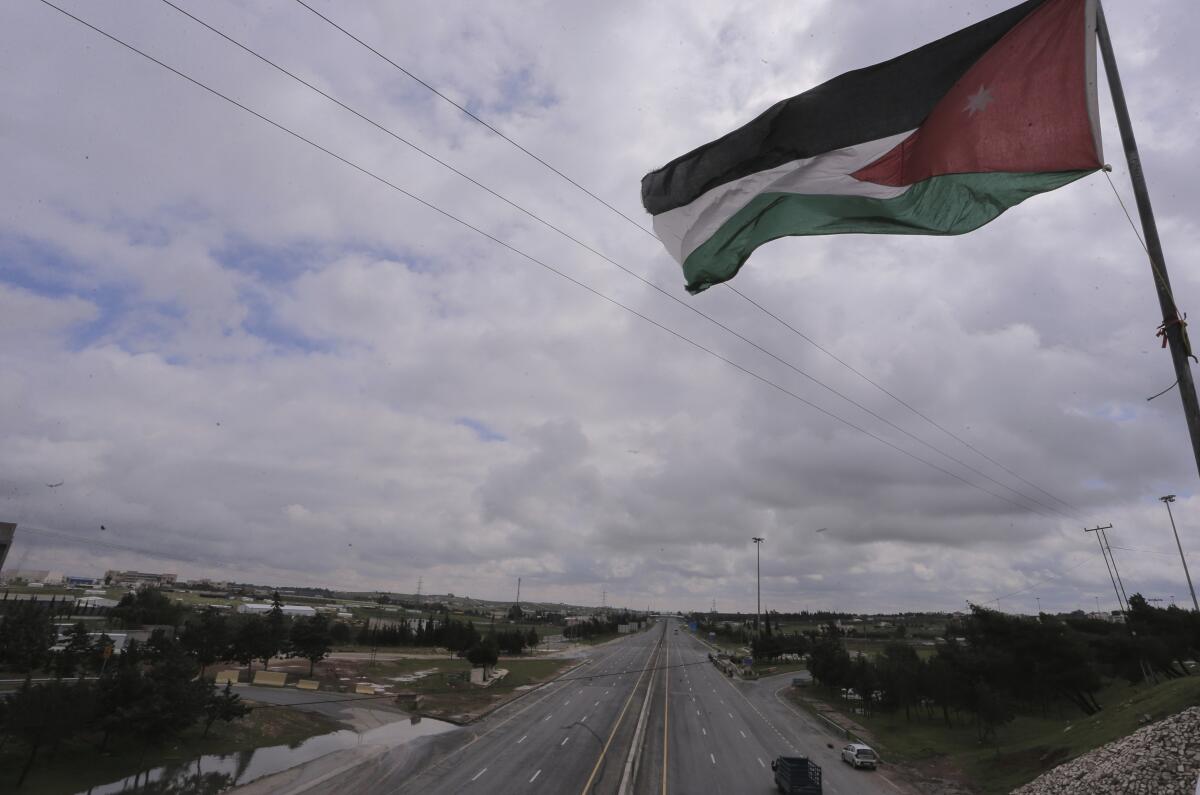After woman’s brutal killing by her father, Jordan asks at what price ‘honor’?

- Share via
BEIRUT — Ahlam dashed out screaming into the street, her father close behind. Bleeding from her neck, she begged her mother, the neighbors — anyone — to intervene.
That was when her father picked up a concrete block and smashed his 40-year-old daughter’s skull in. Then he sat down next to her body with a cigarette in one hand and a cup of tea in the other as he calmly waited for authorities to arrive, according to witness, police and local media accounts.
The brutal public slaying July 17 in a suburb near Jordan’s capital, Amman, was the latest in a string of “honor killings” to hit the Middle Eastern kingdom. It might have gone unnoticed, like so many others before it, except that it was caught on video and widely seen on social media. The video of Ahlam’s cries ignited a furious nationwide debate not only over the myriad ways Jordan’s legal system has failed to protect women, but also over how they’re viewed in the deeply conservative society.
Ahlam, whose last name has not been publicly released, wasn’t the first woman to have lost her life in an honor killing in Jordan this year; activists estimate at least nine such slayings so far but believe many more have gone unreported. Human Rights Watch says Jordan suffers anywhere from 15 to 20 such crimes a year. For the country’s defenders of women’s rights, Ahlam’s death was a breaking point.
“We’ve had enough. This crime, it made it too hard, too difficult for us to wait any longer,” said Rose Mahmoud, a Jordanian activist, in a phone interview. She joined a handful of others to organize a protest last Wednesday demanding a change to laws they say afford perpetrators of femicide reduced sentences under the guise of restoring family honor.
“There’s no deterrent if you hand the criminal half the sentence or other reductions to the punishment. When a criminal hears this, he thinks ‘Yalla, it’s just a few years and then I’ll come out,’” Mahmoud said.
“As long as we give half-sentences to such crimes, nothing will change. Nothing will change.”
The protest, held amid coronavirus restrictions in Amman, drew more than 500 people, organizers say. Online, thousands joined hashtag campaigns like #Screams_of_Ahlam, #Blood_Does_Not_Become_Tea and #Stop_Killing_Women. Many recounted other instances where women were attacked or killed by male relatives in response to some perceived breach of societal norms.
Hala Ahed, a lawyer and human rights defender, cited a case in which a father beat his daughter with a stick and poured gasoline on her and burned her to death. Her sin? Being out in public by eating on the roof of the house till sundown. Others recalled a November incident in which a man took a knife to his wife for arguing with him, locking her in a room and gouging out her eyes in front of her children. Or the brother who killed his 14-year-old sister when she created a Facebook account, for what he assumed were for shameful purposes.
Honor killings are not exclusive to Jordan or the Middle East. Southeast Asian nations, Mediterranean countries and Europe have all seen violence inspired by a supposed honor code usually defined by men. More generally, violence against women, which already affected about 243 million women and girls worldwide in the 12 months before the COVID-19 crisis, according to figures from U.N. Women, has skyrocketed during lockdown; United Nations officials call it a “shadow pandemic.”
Despite decades of initiatives from the government and activist groups to stop gender-related crimes, Jordan saw nearly 11,000 cases of domestic violence last year and has one of the highest rates of honor killings in the world. Such slayings are viewed with approval by major segments of Jordanian society, where tribal codes often take precedence over the official legal system and conduct considered unchaste can bring a deep sense of shame to the entire family.
For decades, the laws reflected that stance, allowing killers to get off scot-free. Judges, officials and police officers — the vast majority of them men — often were sympathetic to the perpetrator’s views. Rights groups seeking change were accused of being Western-influenced provocateurs intent on spreading moral degradation.
Still, there have been some victories. In 1997, the government created within its police force the Family Protection Department, which is tasked with investigating and addressing domestic violence and sexual assault cases against women and children.
In 2016, the government’s Religious Endowments department issued a fatwa saying honor killings are not compatible with Islam.
And despite opposition from conservatives, rights groups have won numerous amendments to the penal code, including one in 2017 that closed a loophole allowing “severe anger” as a mitigating circumstance for men killing women. That same year brought another change to Article 340, a section taken from the French colonial penal code, which exempted a man from punishment for killing or injuring his wife or a female relative discovered committing adultery or “in an unlawful bed.”
Yet activists say the changes have not gone far enough. Article 340 still considers adultery a mitigating, if not exculpatory, factor in a woman’s slaying. Another law allows for sentences to be halved if the victim’s family members drop their “personal right” for a harsher sentence — a probable outcome since the family members are themselves often involved in the death. Though the government opened safe houses in 2018, dozens of women in danger of being killed by their families are still kept in so-called protective custody by police, with some of them spending decades behind bars, purportedly for their own safety.
“The fact that the penal code gives excuses or reasons to reduce the sentence, it’s as if there’s justification for the crime. And society is affected by this,” said Eva Abu Halaweh, head of Mizan Law, a legal charity.
That leniency has pushed attackers to use honor as a defense, activists say, even when the victim was killed or attacked for other motives, including share of an inheritance, money or jealousy.
Tens of thousands of women marched in Mexico City
In many ways, Ahlam’s life and her killing exemplify the social-service system’s shortcomings.
She was divorced and living with her parents. Local media reported she had been engaged in a love affair, a taboo in Jordan. She went to a safe house and stayed for two days before her father came and signed a pledge that no harm would come to her.
A few weeks later, according to several rights activists — who spoke on condition of anonymity after the Jordanian government issued a gag order banning discussion of the case two weeks ago — it became apparent that a marriage to her lover would not happen, making her affair illegitimate and, in the eyes of many, bringing shame to her family. Ahlam had an argument with her father, and he then killed her.
For Abu Halaweh, Ahlam’s trajectory could have been different had there been more robust services from the outset.
“Domestic abuse requires more protection and interventions because you have a private relationship between the aggressor and the [victim]; it’s easy to commit a crime since it’s in private; and families can trick the system by signing a pledge [not to harm the victim] but then do so anyway,” Abu Halaweh said.
The state’s procedures for dealing with domestic abuse, she added, focus primarily on the victim’s immediate safety, with little effort at furthering reconciliation with the family.
“Families are also victims here, because they don’t know how to deal with the problem. We need guidance programs on how they can move on from the problem,” she said.
Breaking News
Get breaking news, investigations, analysis and more signature journalism from the Los Angeles Times in your inbox.
You may occasionally receive promotional content from the Los Angeles Times.
Civil society groups have taken on some of that task, said Salma Nims, who heads Jordan’s National Commission for Women, a semi-governmental organization that advocates for and promotes women’s issues. But there are too few to meet the scale of the problem, and the government often restricts their funding, even if it isn’t coming from the state.
For most activists, the biggest issue in Ahlam’s killing was the support for her father’s murderous act. Some of that reaction could be seen on social media in the days after Ahlam’s killing, with comments saying she deserved to die and harassing protesters and women’s rights activists.
“It’s a society that is ready to find the justification even before it rejects the crime,” Nims said. “Any crime that enters public debate always goes back to questioning the behavior of the woman and whether it justifies what happens to her.”
Jordanian Princess Basma bint Talal, who helped establish the National Commission for Women, said, “A radical shift in approach at all levels needs to signal the fact that conditions for violence, domestic or otherwise, will no longer be tolerated or even condoned.”
“There is no honor in honor killing,” she wrote in a Facebook post last week.
“We can no longer look away.”
More to Read
Sign up for Essential California
The most important California stories and recommendations in your inbox every morning.
You may occasionally receive promotional content from the Los Angeles Times.















